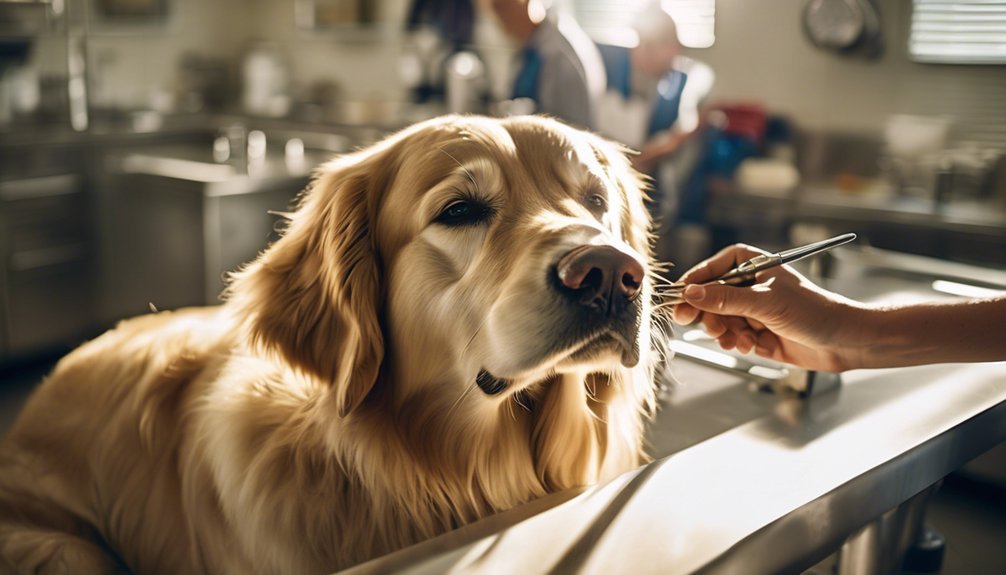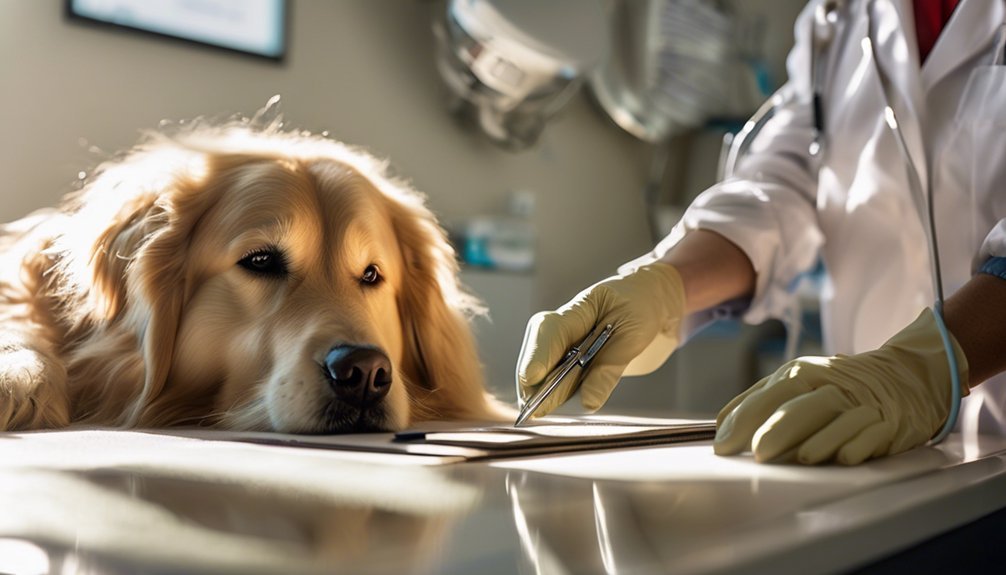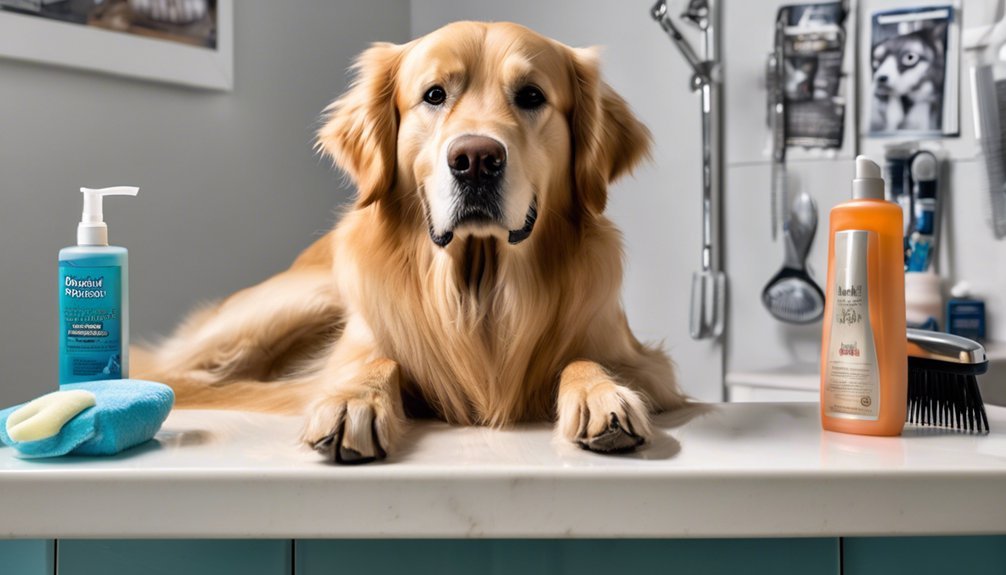
Just as a painter needs a clean canvas, your pet requires regular veterinary check-ups to maintain their coat's health. These visits aren't just routine; they're crucial for spotting skin issues before they escalate. By understanding the importance of these assessments, you can ensure your pet's coat remains vibrant and healthy. What common coat problems should you watch for, and how can your veterinarian help?
Key Takeaways
- Regular vet check-ups enable early detection of skin issues, ensuring prompt treatment and preventing complications that may affect coat health.
- Veterinarians utilize advanced diagnostic tools to identify underlying coat problems, promoting overall well-being and vitality in pets.
- Routine assessments during vet visits help monitor the impact of nutrition and environmental factors on coat health.
- Early intervention by vets can significantly improve a pet's quality of life and maintain a vibrant, healthy coat.
- Establishing a partnership with veterinarians supports proactive care and fosters a stronger bond between pet and owner.
Understanding the Connection Between Coat Health and Overall Well-being

When you consider your pet's overall well-being, it's essential to recognize the significant role their coat plays in reflecting their health. A vibrant, healthy coat often indicates good coat nutrition and proper care.
Nutritional balance is crucial; ensure your pet receives high-quality food rich in essential fatty acids, vitamins, and minerals. These nutrients promote not just a shiny coat but also overall vitality.
Additionally, environmental factors like climate, exposure to allergens, and grooming habits significantly affect coat health. Regular grooming removes dirt and loose hair, preventing matting.
Common Coat Issues to Watch For
A healthy coat can signal that your pet is doing well, but it can also mask underlying issues. Keep an eye out for common coat problems like flea infestations, which can lead to itching and irritation.
Skin infections often arise from wounds or allergies, manifesting as redness or scabs. Allergic reactions may cause excessive scratching, affecting both coat and skin health.
Additionally, nutritional deficiencies can result in a dull, brittle coat that lacks shine. If you notice any of these signs, it's crucial to address them promptly.
Regular vet check-ups can help you catch these issues early, ensuring your furry friend stays happy and healthy. Remember, your pet's coat is a reflection of their overall well-being.
The Role of Veterinarians in Detecting Skin Problems

While you may notice changes in your pet's coat, veterinarians play a crucial role in identifying underlying skin problems that mightn't be immediately apparent.
During routine check-ups, they conduct thorough skin assessments that help uncover issues like infections, allergies, or parasites. You might feel reassured knowing that veterinarians utilize advanced diagnostic tools, such as skin scrapings and allergy tests, to pinpoint the root cause of your pet's discomfort.
These assessments not only address visible symptoms but also promote your furry friend's overall health. By partnering with your veterinarian and keeping regular appointments, you're taking a proactive step in ensuring your pet's coat stays healthy and vibrant.
Trust their expertise to keep your beloved companion in optimal condition.
Benefits of Early Intervention for Coat Conditions
Early intervention for coat conditions can significantly enhance your pet's quality of life and overall well-being.
By prioritizing early detection, you can catch issues before they escalate, ensuring your furry friend remains comfortable and healthy. Proactive care not only addresses existing problems but also helps prevent new ones from developing.
Regular vet check-ups allow you to stay ahead of potential coat conditions, such as allergies or infections. When you act quickly, you can minimize discomfort and reduce the risk of severe complications.
This compassionate approach fosters a stronger bond between you and your pet, as you work together to maintain their health.
Grooming Tips to Complement Veterinary Care

To ensure your pet's coat remains healthy between veterinary visits, incorporating regular grooming into your routine is essential. Use the right grooming tools, like brushes suited for your pet's coat type, to remove dirt and loose hair. Regular brushing not only keeps your pet looking great but also promotes skin health.
When it comes to bathing techniques, opt for pet-specific shampoos to avoid skin irritation. Aim for a bath every 4-6 weeks, but adjust based on your pet's needs.
| Grooming Tools | Bathing Techniques |
|---|---|
| Slicker Brushes | Use lukewarm water |
| De-shedding Tools | Rinse thoroughly |
| Combs | Dry with a towel |
Creating a Regular Vet Check-up Schedule for Your Pet
Establishing a regular vet check-up schedule is crucial for maintaining your pet's overall health and well-being. To ensure your furry friend gets the care they need, consider setting a check-up frequency of at least once a year for most pets.
For seniors or those with health issues, more frequent visits may be necessary. Use a calendar or an app to set appointment reminders, making it easier to stay on track.
Don't hesitate to discuss any concerns with your vet during these visits; they're your partner in your pet's health journey. Regular check-ups not only help monitor coat health but also catch potential issues early, ensuring your beloved companion stays happy and healthy for years to come.
Frequently Asked Questions
How Often Should I Brush My Pet's Coat Between Vet Visits?
You should brush your pet's coat at least once a week, but daily is ideal for long-haired breeds. Use appropriate grooming tools to prevent matting and maintain a healthy, shiny coat between vet visits.
Can Diet Affect My Pet's Coat Health?
Absolutely, your pet's diet significantly impacts their coat health. Incorporating dietary supplements and using quality grooming products can enhance shine and texture, ensuring your furry friend feels comfortable and looks vibrant. You're doing great by considering this!
Are Certain Breeds More Prone to Coat Issues?
Surprisingly, some breeds are more prone to coat issues than others. Breeds with high coat sensitivity often require diligent grooming. Understanding your pet's needs helps you maintain their coat's health and beauty, fostering a deeper bond.
What Signs Indicate a Need for an Urgent Vet Visit?
If you notice excessive shedding, red patches, or unusual odors, it might signal skin infections or other issues. Don't hesitate; getting your pet to the vet promptly can ensure they receive the care they need.
Can Environmental Factors Impact Coat Health?
Yes, environmental factors like weather changes and humidity levels can significantly impact your pet's coat health. Keeping an eye on these elements helps you maintain a healthy, vibrant coat for your furry friend.
Conclusion
In conclusion, just as a well-tended garden flourishes, your pet's coat will thrive with regular veterinary check-ups. By investing in these essential visits, you're not just addressing potential issues; you're nurturing your companion's overall health. Imagine catching a budding weed before it takes over—early intervention allows for targeted care and happier, healthier pets. Make a commitment to regular vet visits, and watch your furry friend blossom with vitality and a beautiful coat.





